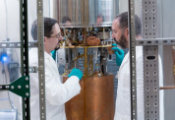UK’s Most Powerful NMR Facility to Open at the University of Birmingham
September 22, 2025 -- The University of Birmingham is set to open its first ever 1.2 GHz NMR facilities, after receiving £6M in funding from UKRI and additional investment from the University, further establishing the West Midlands as a new powerhouse for NMR spectroscopy.
Nuclear magnetic resonance (NMR) spectroscopy is a powerful probe of biomolecular structure and function. The newly installed 1.2 gigahertz (GHz) spectrometer will allow better resolution, increased sensitivity, and new frontiers such as allowing researchers to study large biomolecular assemblies, observe previously "invisible" molecular interactions, dynamics, and transient states.
Joining the University of Warwick as the first two facilities in the UK to house the commercially available NMR spectrometer from Bruker, the new instruments are two of less than 15 similar magnets in the world and follow on from the existing 1.0 GHz facilities at Warwick and Birmingham (the result of a previous £16M investment by UKRI).
Professor Teresa Carlomagno, Academic Lead of the Biomolecular NMR Facility HWB-NMR, University of Birmingham said:
“The 1.2 gigahertz NMR spectrometer provides high-resolution data on molecular structures and dynamics that allows researchers to study complex molecular machinery in cells, such as proteins, nucleic acids, and metabolites.
“This instrument will allow us to determine the 3D shapes of complex molecules, which is crucial because molecular shape dictates function. I'm particularly interested in finding out more on how ribonucleic acids (RNA) work and hope to decode the relationship between its structure and function.”
Professor Rachel K. O’Reilly MBE, Pro-Vice-Chancellor (Research) at the University of Birmingham added:
“We are delighted that EPSRC has chosen Birmingham as one of two institutions to host 1.2 GHz NMR instruments, offering both scientists and students access to state-of-the-art facilities that will help to support transformative molecular discoveries.
“As a research-intensive university, we leverage an interdisciplinary portfolio of molecular sciences to understand and engineer molecular systems for a better future, with NMR spectroscopy representing a key area of focus for the coming years.”
Birmingham’s unveiling of its new facility will enable the University to champion the Midlands as a hub for collaboration and expertise within the field of spectrometry.
Once open, researchers within pharmaceutical and biotechnology industries, academics and students will be able to gain invaluable experience working with the cutting-edge NMR instruments.
Focusing on broadening understanding of biomolecular mechanisms and developing tools to steer molecular function, the spectrometer will enable researchers to compete at the forefront of biomolecular research.
Professor Teresa Carlomagno, Academic Lead of the Biomolecular NMR Facility HWB- NMR, University of Birmingham said:
“We’re extremely excited to receive such a powerful piece of equipment, as it will allow us to advance research into the structure, function, interactions and pathways of proteins and other biomolecules, which will enhance drug discovery and the development of tools to modify and even engineer molecular function.”




































